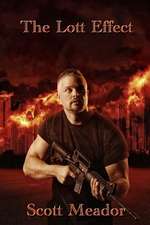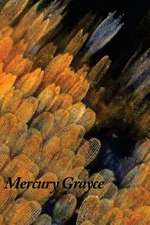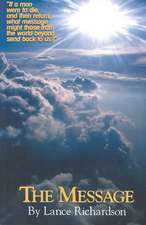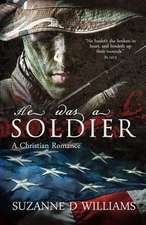Joshua in a Troubled World
Autor Joseph F. Girzoneen Limba Engleză Paperback – 31 mai 2006
Joseph Girzone possesses a unique ability to make Jesus’ words and actions come to life for contemporary audiences. His fictional depictions of Jesus’ return to the present-day world—the Joshua series—have inspired millions of readers. Joshua in a Troubled World is at once a magnificent continuation of his perennially popular series and an enlightening perspective on the political paranoia and destructive acts of vengeance that fill the front pages of our daily newspapers. Arriving in Washington, D.C., Joshua walks along Pennsylvania Avenue with a cool detachment and determination that sets him apart from the bustling crowds. Under ordinary circumstances, he would no doubt be seen simply as a man wrapped in his own thoughts. But in these security-obsessed times, his Middle Eastern appearance and his spontaneous stops at various churches, temples, and mosques inevitably arouse suspicions. Taken into custody by two government agents, Joshua challenges the legal and moral justness of their actions and they reluctantly release him to continue his mission. It is the most difficult and controversial mission he has ever undertaken—a plan to unite Arab- and Jewish-Americans and to work with them to resolve the bitter wars and religious animosities in the Middle East.
Peopled with prominent figures such as Ariel Sharon, and moving from Washington to Beirut and then to Oslo while the peace accords are being hammered out, Joshua in a Troubled World explores the most explosive issues of our day and offers a realistic, compassionate assessment of the things that divide us and the beliefs that can serve as a foundation for a new, more peaceful world.
Preț: 89.63 lei
Nou
Puncte Express: 134
Preț estimativ în valută:
17.15€ • 17.95$ • 14.19£
17.15€ • 17.95$ • 14.19£
Carte disponibilă
Livrare economică 17-31 martie
Preluare comenzi: 021 569.72.76
Specificații
ISBN-13: 9780385511834
ISBN-10: 0385511833
Pagini: 196
Dimensiuni: 145 x 209 x 14 mm
Greutate: 0.19 kg
Editura: IMAGE
ISBN-10: 0385511833
Pagini: 196
Dimensiuni: 145 x 209 x 14 mm
Greutate: 0.19 kg
Editura: IMAGE
Notă biografică
JOSEPH F. GIRZONE retired from the active priesthood in 1981 and embarked on a second career as a writer and speaker. In 1995 he established the Joshua Foundation, an organization dedicated to making Jesus better known throughout the world. His bestselling books include Joshua, A Portrait of Jesus, and Never Alone. He lives in Altamont, New York.
Extras
Chapter 1
Pennsylvania avenue was flowing with pedestrians crisscrossing in every direction like a floating colony of ants. Busy and confusing as it was to the casual eye, one man in that vast crowd stood out. Calm, detached from all around him, he walked with determination. Under ordinary circumstances he would appear as just different, but in the current heavy atmosphere of political paranoia, the man’s Middle Eastern appearance set him apart as possibly sinister. Though poorly dressed, he did not seem like a homeless beggar. His resolute gaze indicated he was a man with a purpose. What kind of purpose? Who was he? Where was he from? What was he doing at this particular time in Washington, D.C.? What made him stand out was his total lack of interest in the sights. Ordinary visitors gawked in every direction, unwilling to miss anything. This man appeared disinterested in everything around him. His detachment caused wonder and aroused suspicion in anyone whose concern was the security of the area. As the stranger walked closer and closer to the White House, he was approached by two neatly dressed men who asked for his identification. Of course, Joshua had none.
“I think you better come with us,” one of them said, flashing his badge as a government agent.
“Why, what have I done?” Joshua asked with a calm, confused look.
“Never mind! Just come with us and don’t give us any trouble.”
As the three walked along, the younger of the two asked Joshua how long he had been in Washington. “I just arrived,” was the quick reply.
“Where did you come from?” was the next question.
Joshua’s vague response told them nothing, increasing their suspicion. A black Ford pulled up along the curb. The driver emerged and opened the rear door. The two men directed Joshua to get in, then took their places on either side of him as the car sped off down the street to an FBI office.
Dan Halloran had been working for the Bureau for a little over a year, having finished his law degree at Georgetown just a few months before. His father had been in the military, spending his last years as a briefing officer at the Pentagon, so they had connections enough to find good positions for family members. Dan was dedicated to his new assignment of monitoring approaches to the White House. Like his father, he was clean-cut, rigid, seeing life in black and white, with no possibility of shades in between. His partner, Tom Clark, was older. He had been an agent for over ten years and was slightly more casual in the performance of his assigned duties, at least as casual as the agency’s discipline would allow.
Sitting on one side of the table with Joshua sitting across from them, the two men interrogated him.
“You said your name was Joshua?” Dan Halloran asked him.
“Yes.”
“What is your last name?” the agent continued.
“I rarely use my last name,” Joshua replied.
“I don’t care whether you use it or not. What is it?”
“Ben-Youssef.”
“Is that Palestinian?” Tom Clark asked him.
“No, the name is Hebrew.”
“Hebrew? Sounds Arabic to me. Are you an American citizen?”
“I belong here, if that is what you are asking.”
“Answer the question,” Dan insisted. “Are you an American? Do you have an American passport?”
“I never needed one.”
“What is your nationality?” Dan asked impatiently, realizing this was not going to be an easy day.
“I have no nationality. I am a member of every family.”
“Then you’re an illegal alien?”
“That is your term. I am not illegal, nor am I here illegally. I have been here long before you were born.”
“Are you just being difficult? Or are you hiding something?” Tom interjected.
“I am hiding nothing. You are the ones who picked me off the street although I had done nothing wrong and have no intention of doing harm to anyone. Why do you suspect me? Because I am poor? Because I look like someone you prejudge to be evil? If I have done nothing wrong, then why do you interrogate me? You are the ones who are doing what is unjust, profiling people because of the way they look and the clothes they wear. Fear does terrible things to people, pushing ordinarily normal people into doing things that would be unthinkable in ordinary times. I am surprised and saddened that this could happen in this beautiful country.”
“Since you cannot prove your citizenship, you must be here illegally,” Dan continued with mounting frustration.
“How many people walking down Pennsylvania Avenue carry with them proof of citizenship? I am not alien to America. I have always been here, and I will always be here. Unless you can prove that I am an illegal alien, I ask that you release me.”
Realizing that they were getting nowhere and that the man was right in saying they had no legal cause to hold him, they fingerprinted him, took his name, declined to demand his Social Security number, since it would be futile anyway, and released him. However, for the whole period of Joshua’s stay, he was shadowed everywhere he went. His every movement was watched and recorded, his every word written down.
Joshua continued wandering through the city, casually enjoying the sights as he walked along, but without appearing to be a tourist stretching his neck to miss nothing. His real purpose was to meet certain individuals, and even though he had been sidetracked by his arrest, he knew just where he had to be and at precisely what times he should be there. Even this apparently unforeseen incident had been taken into consideration.
Joshua’s encounter with the police plainly evidenced the threatening atmosphere pervading the country. It was not always like that, only during times of national stress when people’s basic human rights are often trampled, and the lives of so many innocent people are destroyed, and their reputations and businesses are ruined by the all-pervasive paranoia. Certain government officials will have their way for a few years, then the people come to their senses and realize they have been blinded by zealots whose obsession threatens the rights of everyone. Then the life of the nation drifts back to normal. Hopefully this current obsession would also pass before it did more damage to people than the evil it was trying to prevent.
Continuing his walk around the city, Joshua turned up North Capitol, stopping at St. Aloysius Gonzaga, an old Jesuit church in the heart of the city. Knowing he was being followed, he gave no heed, for he had a much better surveillance system that made it possible for him to be always a giant step ahead of them. After entering the church, he looked around and spotted a man halfway up the middle aisle. He was kneeling with bowed head, deep in prayer. Joshua approached and tapped him on the shoulder. Startled, the man turned and looked up.
“Yes, what do you want?” the man asked in a deep, brusque voice.
“I have come to answer your prayer,” Joshua replied.
“How do you know what I was praying for?”
“You are praying for your son. You are worried about him because of the company he has been keeping lately.”
“What is it you have to tell me? But, first of all, who are you? What is your name?”
“My name is Joshua. And I know your son well. He is a good boy, and you are afraid that he is mixed up in something that will bring him harm and will bring shame upon your family. You are afraid something terrible is going to happen to him.”
“How do you know all these things? I have never told a soul.”
“I understand. But I tell you your son is protected from above. Nothing evil will befall him. He is disturbed over the plight of your people and wants to do something heroic, but he has innocently approached the wrong people.”
“Sir, you are right. I know what you are saying. That is why I am so afraid. I have heard of those people. I grew up with some of them, but they are nothing like our family. We are a good, honest people, and hardworking. My son has always been a good boy. I pray to God that nothing will happen to him.”
The man extended his hand to Joshua. “My name is Benyamin. I came here years ago to escape trouble in my country. Bethlehem, where I lived, was supposed to be a city of peace, but we have never known a day of peace. I thought that if I brought my family here, we would find peace. For a while we did, but now it is all turning sour, and I am afraid things will get worse. People follow us because we look suspicious and our names are strange, and because we came from Palestine.”
“Benyamin, do not worry! I know you well. You and your family are people of deep faith. God has something very special for your son to do. Do not worry about him! God has answered your prayers. Your son will be safe.”
“How do you know?” the man asked.
“I know. Trust me. Go home and tell your wife to be at peace. All will be well with your son.”
“I don’t know who you are, sir, or how you know, but you already make me feel at peace,” the man said as tears began to flow down his cheeks.
As Joshua turned to leave the church, the man continued his prayers, this time thanking God for all His goodness.
As soon as Joshua stepped outside, he noticed the two agents casually watching from across the street. It brought back memories of days of old, when scribes and Pharisees and their henchmen followed him everywhere he went, jotting notes, cataloging his every move and everything he said and the names of the people close to him. He knew that this would be even more complicated because of the modern sophisticated eavesdropping equipment that made it possible for spies to snoop almost totally undetected. He would have to be careful, “simple as a dove, sly as a fox.” Yet it really did not trouble him; he was going to have fun, since he knew his own eavesdropping abilities were far superior to their electronic gadgets. He would have no trouble outfoxing them.
As Joshua continued his walk up North Capitol, he encountered a group of African-American children playing along the sidewalk. As he approached, the children stopped playing and stood watching him. Besides looking different, he seemed different in other ways, not like an American, but like a foreigner of some kind. It was an almost totally black neighborhood. Joshua noticed the surprised look on their faces and smiled.
“Good day, little ones! You are such happy children. Always be happy. God made you to be happy. See all the beautiful things my Father has created just so you could enjoy them and be happy?”
“What beautiful things?” a skinny eight-year-old boy questioned cynically. “Everything around here is dirty and noisy. Even the buildings are falling apart.”
“Yes, it is sad, isn’t it,” Joshua replied. “Someday you will live in a much nicer place, but even here there are beautiful things.”
“Where?” the boy asked. “I don’t see anything beautiful.”
“What about Semantha?” who beamed when Joshua mentioned her name. “And Hakim? What about him? He’s beautiful, too.”
“She ain’t beautiful. She’s my sister. And Hakim? Hakim, yeah, man, you’re beautiful. Wait till I tell everybody that this dude said you’re beautiful.”
“Quit it, Charles, or I’ll tell everybody you still suck your thumb.”
Joshua smiled. “You are all just having fun. Don’t let your feelings get hurt when friends are playing with you. Just laugh.”
“Mister, who are you, anyway?” Hakim asked. “We never saw you around here before. Besides, you’re white. White people don’t walk around here.”
“I don’t see color. I just see a beautiful creation of God. You are all beautiful. So, there are three things that are beautiful. Now look at that rosebush over there against the house. It’s coming right out of the crack between the house and the concrete. Look at those roses, how red and brilliant they are. They even smell nice. Did you ever smell a rose?”
“No,” Hakim replied.
After picking a rose off the bush, Joshua let them smell it.
“That smells nice,” Hakim said with surprise.
Then the others smelled it. “Man, that smells pretty,” Charles said.
Then Joshua gave the rose to Semantha. “Here, Semantha, God let that rosebush grow right out of the concrete just so He would have something beautiful to show you.”
“What’s your name? Who are you?” Charles asked.
“Joshua, that’s my name. I have come to give people hope, to help them to be happy, because God wants His children to be happy.”
“Mister, even if you’re not a brother, you’re nice. Will we see you again?” Hakim asked.
“I think so, someday,” Joshua replied.
Finally, Semantha spoke up. “Joshua, how did you know our names when we didn’t tell you?”
Joshua just smiled and answered softly, “I’ve known you for a long time.”
As he began to walk away, he told them, “Be happy, always be happy, and be kind . . . even to those who may seem different and unimportant!”
Joshua continued on his way. Stopping in front of a Baptist church not far up the street, he talked to a handful of people gathered around their minister, discussing possible renovations to the facade of their church.
“Hello,” he said as he approached.
After turning to see who it was, one person returned the greeting. The others just continued their discussion. Joshua walked over to the man who greeted him.
“My name is Joshua. Thank you for being kind enough to say hello,” he said as he extended a hand.
“I’m George, George Payne. I have to admit I was sort of surprised seeing someone who is not a brother walking down our neighborhood. Most people would be afraid.”
“I am not afraid. I love all people. I see you are considering renovations to your church.”
“Yes, they’re badly needed. Have been for a long time, but only lately do we have a little bit of money saved to do the job. But now we don’t know where to start.”
“I am sure you will do a good job. I’ll pray for it, George. And thank you for being so gracious toward a stranger.”
“You’re a nice man. May the Lord’s peace be with you.”
“Thank you, and with you as well.”
As Joshua continued on his walk, he noticed the agents still following him, at a supposedly discreet distance. He merely smiled, knowing he already had them confused. The walk up North Capitol past the old waterworks led to an entirely different atmosphere, of colleges, churches, and monasteries, with even more monasteries and churches than around the immediate vicinity of the Vatican. It was also the site of a relatively new sanctuary dedicated to the Virgin Mary. As Joshua proceeded up the walkway toward the Romanesque marble structure, he knew this would completely baffle the agents following him. From a church where he talked to a Palestinian, to a Baptist church where he talked briefly to a black Baptist, and now to a Roman Catholic basilica. He knew what they were thinking: What do all these have in common? It doesn’t make sense. What’s his point? What is he doing now, at a Catholic place, after meeting an Arab man and stopping to talk at a black Baptist place?
Once inside the church, Joshua looked up at the huge, brilliant mosaic on the vaulted ceiling above the main altar. His peaceful look quickly changed to an uncomfortable grimace, showing his displeasure with the artist’s idea of Jesus. Joshua knew that even at the Last Judgment, Jesus’ love and compassion would still triumph even as people’s consciences convicted them of self-centered sinfulness in the presence of Eternal Goodness.
Pennsylvania avenue was flowing with pedestrians crisscrossing in every direction like a floating colony of ants. Busy and confusing as it was to the casual eye, one man in that vast crowd stood out. Calm, detached from all around him, he walked with determination. Under ordinary circumstances he would appear as just different, but in the current heavy atmosphere of political paranoia, the man’s Middle Eastern appearance set him apart as possibly sinister. Though poorly dressed, he did not seem like a homeless beggar. His resolute gaze indicated he was a man with a purpose. What kind of purpose? Who was he? Where was he from? What was he doing at this particular time in Washington, D.C.? What made him stand out was his total lack of interest in the sights. Ordinary visitors gawked in every direction, unwilling to miss anything. This man appeared disinterested in everything around him. His detachment caused wonder and aroused suspicion in anyone whose concern was the security of the area. As the stranger walked closer and closer to the White House, he was approached by two neatly dressed men who asked for his identification. Of course, Joshua had none.
“I think you better come with us,” one of them said, flashing his badge as a government agent.
“Why, what have I done?” Joshua asked with a calm, confused look.
“Never mind! Just come with us and don’t give us any trouble.”
As the three walked along, the younger of the two asked Joshua how long he had been in Washington. “I just arrived,” was the quick reply.
“Where did you come from?” was the next question.
Joshua’s vague response told them nothing, increasing their suspicion. A black Ford pulled up along the curb. The driver emerged and opened the rear door. The two men directed Joshua to get in, then took their places on either side of him as the car sped off down the street to an FBI office.
Dan Halloran had been working for the Bureau for a little over a year, having finished his law degree at Georgetown just a few months before. His father had been in the military, spending his last years as a briefing officer at the Pentagon, so they had connections enough to find good positions for family members. Dan was dedicated to his new assignment of monitoring approaches to the White House. Like his father, he was clean-cut, rigid, seeing life in black and white, with no possibility of shades in between. His partner, Tom Clark, was older. He had been an agent for over ten years and was slightly more casual in the performance of his assigned duties, at least as casual as the agency’s discipline would allow.
Sitting on one side of the table with Joshua sitting across from them, the two men interrogated him.
“You said your name was Joshua?” Dan Halloran asked him.
“Yes.”
“What is your last name?” the agent continued.
“I rarely use my last name,” Joshua replied.
“I don’t care whether you use it or not. What is it?”
“Ben-Youssef.”
“Is that Palestinian?” Tom Clark asked him.
“No, the name is Hebrew.”
“Hebrew? Sounds Arabic to me. Are you an American citizen?”
“I belong here, if that is what you are asking.”
“Answer the question,” Dan insisted. “Are you an American? Do you have an American passport?”
“I never needed one.”
“What is your nationality?” Dan asked impatiently, realizing this was not going to be an easy day.
“I have no nationality. I am a member of every family.”
“Then you’re an illegal alien?”
“That is your term. I am not illegal, nor am I here illegally. I have been here long before you were born.”
“Are you just being difficult? Or are you hiding something?” Tom interjected.
“I am hiding nothing. You are the ones who picked me off the street although I had done nothing wrong and have no intention of doing harm to anyone. Why do you suspect me? Because I am poor? Because I look like someone you prejudge to be evil? If I have done nothing wrong, then why do you interrogate me? You are the ones who are doing what is unjust, profiling people because of the way they look and the clothes they wear. Fear does terrible things to people, pushing ordinarily normal people into doing things that would be unthinkable in ordinary times. I am surprised and saddened that this could happen in this beautiful country.”
“Since you cannot prove your citizenship, you must be here illegally,” Dan continued with mounting frustration.
“How many people walking down Pennsylvania Avenue carry with them proof of citizenship? I am not alien to America. I have always been here, and I will always be here. Unless you can prove that I am an illegal alien, I ask that you release me.”
Realizing that they were getting nowhere and that the man was right in saying they had no legal cause to hold him, they fingerprinted him, took his name, declined to demand his Social Security number, since it would be futile anyway, and released him. However, for the whole period of Joshua’s stay, he was shadowed everywhere he went. His every movement was watched and recorded, his every word written down.
Joshua continued wandering through the city, casually enjoying the sights as he walked along, but without appearing to be a tourist stretching his neck to miss nothing. His real purpose was to meet certain individuals, and even though he had been sidetracked by his arrest, he knew just where he had to be and at precisely what times he should be there. Even this apparently unforeseen incident had been taken into consideration.
Joshua’s encounter with the police plainly evidenced the threatening atmosphere pervading the country. It was not always like that, only during times of national stress when people’s basic human rights are often trampled, and the lives of so many innocent people are destroyed, and their reputations and businesses are ruined by the all-pervasive paranoia. Certain government officials will have their way for a few years, then the people come to their senses and realize they have been blinded by zealots whose obsession threatens the rights of everyone. Then the life of the nation drifts back to normal. Hopefully this current obsession would also pass before it did more damage to people than the evil it was trying to prevent.
Continuing his walk around the city, Joshua turned up North Capitol, stopping at St. Aloysius Gonzaga, an old Jesuit church in the heart of the city. Knowing he was being followed, he gave no heed, for he had a much better surveillance system that made it possible for him to be always a giant step ahead of them. After entering the church, he looked around and spotted a man halfway up the middle aisle. He was kneeling with bowed head, deep in prayer. Joshua approached and tapped him on the shoulder. Startled, the man turned and looked up.
“Yes, what do you want?” the man asked in a deep, brusque voice.
“I have come to answer your prayer,” Joshua replied.
“How do you know what I was praying for?”
“You are praying for your son. You are worried about him because of the company he has been keeping lately.”
“What is it you have to tell me? But, first of all, who are you? What is your name?”
“My name is Joshua. And I know your son well. He is a good boy, and you are afraid that he is mixed up in something that will bring him harm and will bring shame upon your family. You are afraid something terrible is going to happen to him.”
“How do you know all these things? I have never told a soul.”
“I understand. But I tell you your son is protected from above. Nothing evil will befall him. He is disturbed over the plight of your people and wants to do something heroic, but he has innocently approached the wrong people.”
“Sir, you are right. I know what you are saying. That is why I am so afraid. I have heard of those people. I grew up with some of them, but they are nothing like our family. We are a good, honest people, and hardworking. My son has always been a good boy. I pray to God that nothing will happen to him.”
The man extended his hand to Joshua. “My name is Benyamin. I came here years ago to escape trouble in my country. Bethlehem, where I lived, was supposed to be a city of peace, but we have never known a day of peace. I thought that if I brought my family here, we would find peace. For a while we did, but now it is all turning sour, and I am afraid things will get worse. People follow us because we look suspicious and our names are strange, and because we came from Palestine.”
“Benyamin, do not worry! I know you well. You and your family are people of deep faith. God has something very special for your son to do. Do not worry about him! God has answered your prayers. Your son will be safe.”
“How do you know?” the man asked.
“I know. Trust me. Go home and tell your wife to be at peace. All will be well with your son.”
“I don’t know who you are, sir, or how you know, but you already make me feel at peace,” the man said as tears began to flow down his cheeks.
As Joshua turned to leave the church, the man continued his prayers, this time thanking God for all His goodness.
As soon as Joshua stepped outside, he noticed the two agents casually watching from across the street. It brought back memories of days of old, when scribes and Pharisees and their henchmen followed him everywhere he went, jotting notes, cataloging his every move and everything he said and the names of the people close to him. He knew that this would be even more complicated because of the modern sophisticated eavesdropping equipment that made it possible for spies to snoop almost totally undetected. He would have to be careful, “simple as a dove, sly as a fox.” Yet it really did not trouble him; he was going to have fun, since he knew his own eavesdropping abilities were far superior to their electronic gadgets. He would have no trouble outfoxing them.
As Joshua continued his walk up North Capitol, he encountered a group of African-American children playing along the sidewalk. As he approached, the children stopped playing and stood watching him. Besides looking different, he seemed different in other ways, not like an American, but like a foreigner of some kind. It was an almost totally black neighborhood. Joshua noticed the surprised look on their faces and smiled.
“Good day, little ones! You are such happy children. Always be happy. God made you to be happy. See all the beautiful things my Father has created just so you could enjoy them and be happy?”
“What beautiful things?” a skinny eight-year-old boy questioned cynically. “Everything around here is dirty and noisy. Even the buildings are falling apart.”
“Yes, it is sad, isn’t it,” Joshua replied. “Someday you will live in a much nicer place, but even here there are beautiful things.”
“Where?” the boy asked. “I don’t see anything beautiful.”
“What about Semantha?” who beamed when Joshua mentioned her name. “And Hakim? What about him? He’s beautiful, too.”
“She ain’t beautiful. She’s my sister. And Hakim? Hakim, yeah, man, you’re beautiful. Wait till I tell everybody that this dude said you’re beautiful.”
“Quit it, Charles, or I’ll tell everybody you still suck your thumb.”
Joshua smiled. “You are all just having fun. Don’t let your feelings get hurt when friends are playing with you. Just laugh.”
“Mister, who are you, anyway?” Hakim asked. “We never saw you around here before. Besides, you’re white. White people don’t walk around here.”
“I don’t see color. I just see a beautiful creation of God. You are all beautiful. So, there are three things that are beautiful. Now look at that rosebush over there against the house. It’s coming right out of the crack between the house and the concrete. Look at those roses, how red and brilliant they are. They even smell nice. Did you ever smell a rose?”
“No,” Hakim replied.
After picking a rose off the bush, Joshua let them smell it.
“That smells nice,” Hakim said with surprise.
Then the others smelled it. “Man, that smells pretty,” Charles said.
Then Joshua gave the rose to Semantha. “Here, Semantha, God let that rosebush grow right out of the concrete just so He would have something beautiful to show you.”
“What’s your name? Who are you?” Charles asked.
“Joshua, that’s my name. I have come to give people hope, to help them to be happy, because God wants His children to be happy.”
“Mister, even if you’re not a brother, you’re nice. Will we see you again?” Hakim asked.
“I think so, someday,” Joshua replied.
Finally, Semantha spoke up. “Joshua, how did you know our names when we didn’t tell you?”
Joshua just smiled and answered softly, “I’ve known you for a long time.”
As he began to walk away, he told them, “Be happy, always be happy, and be kind . . . even to those who may seem different and unimportant!”
Joshua continued on his way. Stopping in front of a Baptist church not far up the street, he talked to a handful of people gathered around their minister, discussing possible renovations to the facade of their church.
“Hello,” he said as he approached.
After turning to see who it was, one person returned the greeting. The others just continued their discussion. Joshua walked over to the man who greeted him.
“My name is Joshua. Thank you for being kind enough to say hello,” he said as he extended a hand.
“I’m George, George Payne. I have to admit I was sort of surprised seeing someone who is not a brother walking down our neighborhood. Most people would be afraid.”
“I am not afraid. I love all people. I see you are considering renovations to your church.”
“Yes, they’re badly needed. Have been for a long time, but only lately do we have a little bit of money saved to do the job. But now we don’t know where to start.”
“I am sure you will do a good job. I’ll pray for it, George. And thank you for being so gracious toward a stranger.”
“You’re a nice man. May the Lord’s peace be with you.”
“Thank you, and with you as well.”
As Joshua continued on his walk, he noticed the agents still following him, at a supposedly discreet distance. He merely smiled, knowing he already had them confused. The walk up North Capitol past the old waterworks led to an entirely different atmosphere, of colleges, churches, and monasteries, with even more monasteries and churches than around the immediate vicinity of the Vatican. It was also the site of a relatively new sanctuary dedicated to the Virgin Mary. As Joshua proceeded up the walkway toward the Romanesque marble structure, he knew this would completely baffle the agents following him. From a church where he talked to a Palestinian, to a Baptist church where he talked briefly to a black Baptist, and now to a Roman Catholic basilica. He knew what they were thinking: What do all these have in common? It doesn’t make sense. What’s his point? What is he doing now, at a Catholic place, after meeting an Arab man and stopping to talk at a black Baptist place?
Once inside the church, Joshua looked up at the huge, brilliant mosaic on the vaulted ceiling above the main altar. His peaceful look quickly changed to an uncomfortable grimace, showing his displeasure with the artist’s idea of Jesus. Joshua knew that even at the Last Judgment, Jesus’ love and compassion would still triumph even as people’s consciences convicted them of self-centered sinfulness in the presence of Eternal Goodness.
Recenzii
“Girzone draws on the wisdom of the centuries, writing [with] humanity and spirit.” —Kirkus Reviews
Descriere
The bestselling Joshua series takes an invigorating, timely new turn as Girzone's beloved hero spreads his message of love and compassion from the streets of our nation's capital to the blood-soaked lands of the Middle East.
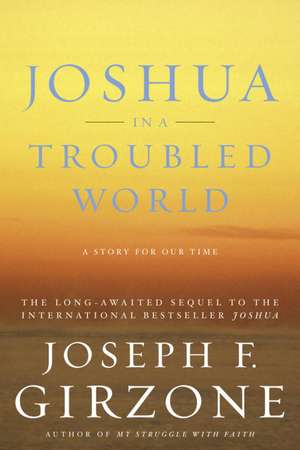







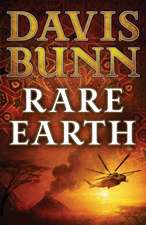


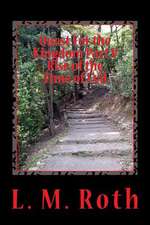

![Poslednij Pamyatnik [Latest Statue] (Russian Edition)](https://i3.books-express.ro/bt/9781484898284/poslednij-pamyatnik-latest-statue-russian-edition.jpg)



